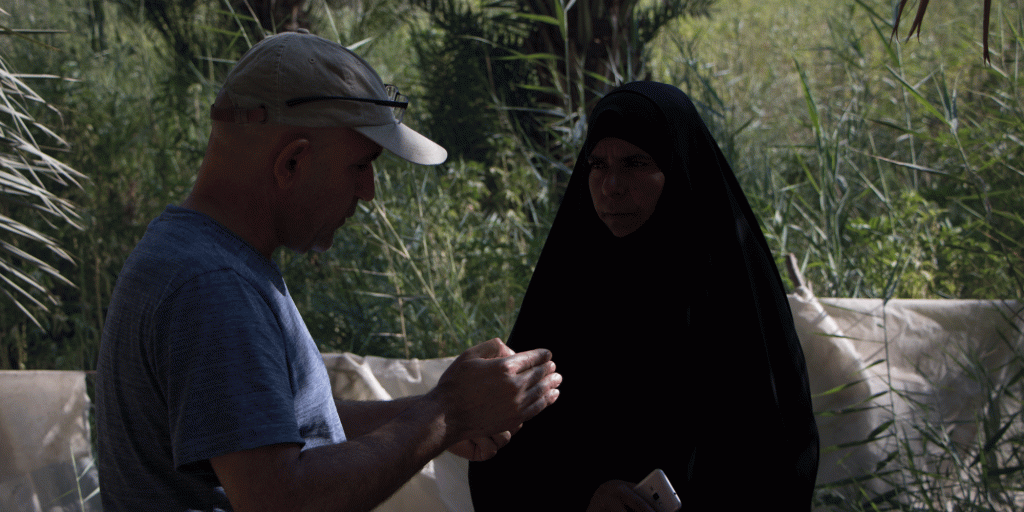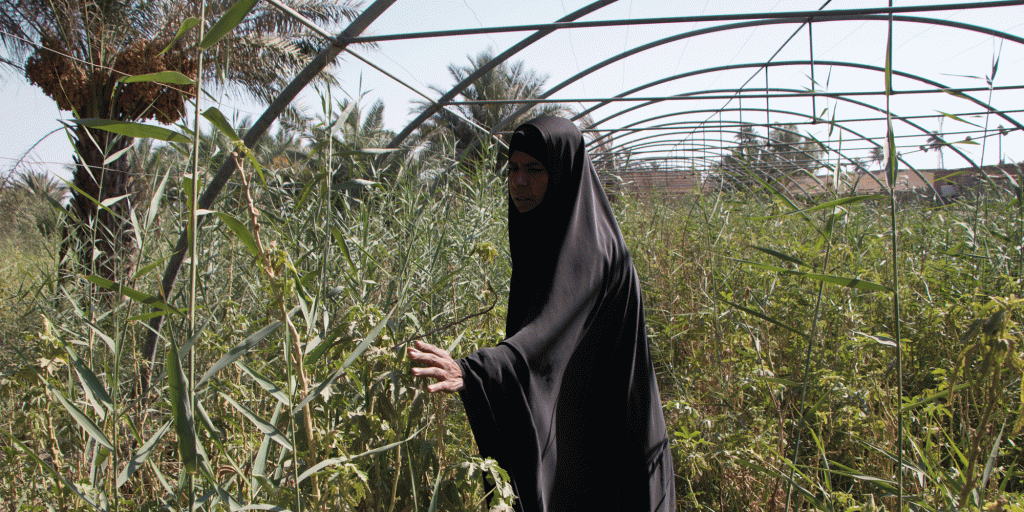I pay her a visit at her house, surrounded by palm trees that are laden with dates. There is an okra grove next to her sitting room,. Even though the temperature exceeds 41 °C, we begin our chat calling it a moderately hot day. That is because July and August had witnessed unprecedented temperatures this year that exceeded 50 °C. I ask Halimah’s father whether this scorching heat was usual in the south. Not since the heat wave of the 1950s, he says.
Halimah provides for four families who do not otherwise receive any support apart from this agricultural land. Being the only one capable of working in the field, she had no choice but to find ways to adapt to climate change. Her only son, Akeel, lost his arm in the battle against ISIS, one of many victims of a war that cost Iraqis immeasurable losses. Her father is too old to work, too. He spends his time telling stories of the family, the village, and the whole country. As for Halimah, she has become a symbol of Iraqi nature in the south and the suffering climate change brings upon it: a long, hot summer, followed by a short winter that brings torrential rains and floods.

I am impressed by Halimah’s vast knowledge about climate change and environmental pollution. Highly connected to the land she worked for three decades, this woman who did not complete her elementary school uses scientific facts to speak of solutions that are directly inspired by nature itself. On her smartphone, she avidly follows the latest news related to climate change and how it is being fought around the world. She had first stumbled upon the meaning of the phenomenon when she was visiting the Central Hospital for Children’s Cancer in Baghdad. She got emotional looking at those frail bodies, and watching them fight the vicious disease.
She wondered why the disease is spreading in her country. The answers she heard pointed to water pollution and its effect on agriculture. Climate change came up a lot, too. Back home in Diwaniya, Halimah became fascinated with the topic. Her smartphone turned into a gateway to knowledge in all fields related to pollution, climate and agriculture. Before that, she had only intuitively sensed the magnitude of the problem, when the temperatures rose in al-Fadiliya to 50 °C leading to unprecedented drought. Suddenly, there was never enough water for the plants.


Um-Akeel’s readings only confirmed what she had been witnessing in front of her eyes. The effect of climate change is very palpable here. Just a few years ago, she used to plant shoots in August and move them into the greenhouse some time between the end of September and mid-October. “Now,” she says, “we are in the second week of September and it is still too hot to even plant shoots. Farming used to end in December with the beginning of the cold season. Now that is impossible, because of the continuing heat.”
In the last few years, drought and scarcity of groundwater forced Halimah al-Sawady to consider unconventional irrigation methods. Hence, drip-irrigation, a system she received from the local department of agriculture, which she says not only helped overcome drought, but also saved excess water. She first learned about this new irrigation method on her smartphone, and it made her take the internet more seriously.
So for this southern farmer, letting go of the land is out of the question. So is wasting her energy crying over the old days when water was abundant. One needs to embrace technology and work with it, instead. In this age, water rationing is a reality farmers cannot ignore anymore. On the other hand, when she read that modern agricultural techniques, such as adding ripening agents and fruit-expanders, was behind the spread of diseases like cancer, she decided to abandon chemical fertilizers altogether, for in addition to affecting the produce itself, they seep into groundwater and pollute it as well. She switched to purely organic fertilizers.
When the information is in a foreign language, Halimah studies the accompanying pictures instead: “I’ve been a farmer for three decades,” she reminds me, “so when I look at the pictures and drawings I can understand what they are doing and what information they want to convey.” But now, a great deal of information is available in Arabic, too. Thanks to that, Halimah has learned how to farm worms. Worms not only decompose the soil, but they also eradicate harmful bacteria. Halimah uses the worms to harness useful bacteria and compost.
Whiteflies and aphids, feeding on plants’ sap and attacking leaves, burgeons, flowers, and even fruit and vegetable seeds, constitute another challenge for farmers of South Iraq. As a preventive treatment, Halimah uses garlic, especially to treat aphids which produce 100 larvae every day, and are capable of totally destroying the crop. Garlic has a long history in Iraqi culture. The ancients used to place garlic under their pillows at night to ward off evil spirits. Garlic is also an antifungal agent.






